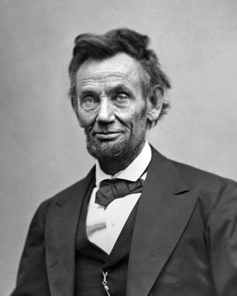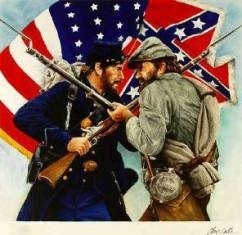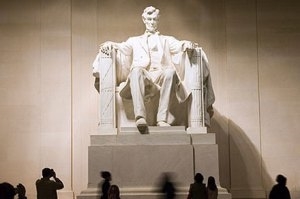 |
| (http://historynewsnetwork.org/article/157445 ()) |
According to Abraham Lincoln, his father moved to the vast wilderness of Indiana when he was eight, and his stepmother died when he was ten (Friedel). When it came to the difficulties Lincoln had to overcome, his childhood was just the tip of the iceberg. "Sixteenth president of the United States and president during the Civil War, Abraham Lincoln (1809-1865) was immortalized by his Emancipation Proclamation, his Gettysburg Address, and two outstanding inaugural addresses." ("Abraham Lincoln"). Abraham Lincoln was born on February 12, 1809, in a log cabin, in Hardin County, Kentucky ("Abraham Lincoln") "In 1858, his growing concern over the expansion of slavery convinced him to join the antislavery republican political party and oppose Democrat Stephen A. Douglas (1813-1861) for the U.S. Senate" (Hillstrom, Hillstrom, and Baker). On the night of April 14, 1865, Good Friday, the president was shot while attending a performance at Ford's Theater in Washington. A hero must be diligent when it comes to their duty. A hero should also be a leader despite everyone else's opinions. Abraham Lincoln was one of America's greatest heroes, because he possessed leadership and devotion in his life
Abraham Lincoln displayed leadership in the fight against slavery, and in office during the Civil War. Lincoln declared his stand against slavery during the Lincoln-Douglas debates: "'I clearly see, as I think, a powerful plot to make slavery universal and perpetual in this nation. The effort to carry that plot through will be persistent and long continued,' he said. 'I enter upon the contest to contribute my humble and temporary mite [bit] in opposition to that effort.'" (Hillstrom, Hillstrom, and Baker). Although a large sum of people chose to nationalize slavery, Lincoln decided to embark on a road less traveled and fought for his convictions. Abraham Lincoln showed leadership by starting a movement against slavery with the intent to transform the nation for the better. Another example of Lincoln's leadership was when he gave his First Inaugural Address, he stated that, "in doing this there needs to be no bloodshed or violence, and there shall be none unless it be forced upon the national authority. The power confided to me will be used to hold, occupy, and possess the property and places belonging to the Government and to collect the duties and imposts; but beyond what may be necessary for these objects, there will be no invasion, no using of force against or among the people anywhere. Where hostility to the United States in any interior locality shall be so great and universal as to prevent competent resident citizens from holding the Federal offices, there will be no attempt to force obnoxious strangers among the people for that object" (Lincoln). Lincoln claimed that the people who wished to do harm upon the government would not win without a fight. He was a leader because he used his power to protect the nation against all threats in the way during the war. To be a leader, one must stand for their beliefs, and do whatever it takes to do the right thing, even when times get tough.
 |
| (http://mrkash.com/activities/civilwar.html ()) |
Lincoln showed immense devotion in his quest to end the war and bring peace to the nation. Because of Lincoln's expertise in debating, he persuaded people to agree with his political views: "Still, Lincoln did experience problems with incompetent and insubordinate (disobedient) generals in the early years of the war. He also faced constant criticism from opponents who disagreed with his policies. He even struggled to maintain order within his own cabinet (a group of advisors who head various government departments). But he overcame these difficulties with tact, diplomacy, and an unbending dedication to doing whatever was necessary to secure victory." (Hillstrom, Hillstrom, and Baker). Lincoln faced problems with everyone around him, but took action and displayed determination where most people would not. He demonstrated devotion because he never backed down, even when the odds were against him. When Lincoln gave his Gettysburg Address, he stated that "It is rather for us to be here dedicated to the great task remaining before us---that from these honored dead we take increased devotion to that cause for which they gave the last full measure of devotion---that we here highly resolve that these dead shall not have died in vain---that this nation, under God, shall have a new birth of freedom---and that government of the people, by the people, for the people, shall not perish from the earth." (Historic World Heroes). Lincoln intended to avenge the deaths of those who fought in the Civil War, not by killing those on the other side of it, but by bringing the two sides together. Lincoln exhibited devotion by swearing to avenge the nation's warriors and ending the war. When life gets hard, a hero does not accept their fate, they use all of their willpower to change it.
 |
| (http://pasteur-martin-makabu.blogspot.com/ ()) |
Lincoln's devotion and leadership led him to be one of America's most recognized heroes. Abraham Lincoln was aware of the problems that would present themselves when he entered office, "Yet, with all this scope of precedent, I now enter upon the same task for the brief constitutional term of four years under great and peculiar difficulty. A disruption of the Federal Union, heretofore only menaced, is now formidably attempted." (Lincoln). When Lincoln arrived in office, a new danger emerged that could possibly affect the entire future of America. What makes Abraham Lincoln an inspiration to me is his bravery to step into office while the nation was stalked by a Civil War.. Christopher Reeves once said "I think a hero is an ordinary individual who finds the strength to persevere and endure in spite of overwhelming obstacles" (The History of the Reeve Foundation). Abraham achieved this and more when he led the nation to victory in the war, and freed all slaves in his Emancipation Proclamation. The purpose of a hero is not only to make a difference in this world, but also to persuade others to become heroes themselves. Works Cited Freidel, Frank. "Abraham Lincoln." The White House. The White House, 2006. Web. 06 May 2015. "Abraham Lincoln." Encyclopedia of World Biography. 2nd ed. Vol. 9. Detroit: Gale, 2004. 415-418. Gale Virtual Reference Library. Web. 4 May 2015. "Abraham Lincoln." American Civil War Reference Library. Kevin Hillstrom and Laurie Collier Hillstrom. Ed. Lawrence W. Baker. Vol. 2: Biographies. Detroit: UXL, 2000. 265-278. Gale Virtual Reference Library. Web. 5 May 2015. "First Inaugural Address of Abraham Lincoln." Library of Congress. Lillian Goldman Law Library, n.d. Web. 07 May 2015 "Abraham Lincoln." Historic World Leaders. Gale, 1994. Biography in Context. Web. 7 May 2015. "The History of the Reeve Foundation." Christopher & Dana Reeve Foundation. Christopher and Dana Reeve Foundation, n.d. Web. 14 May 2015.
Page created on 5/21/2015 12:00:00 AM
Last edited 5/21/2015 12:00:00 AM
